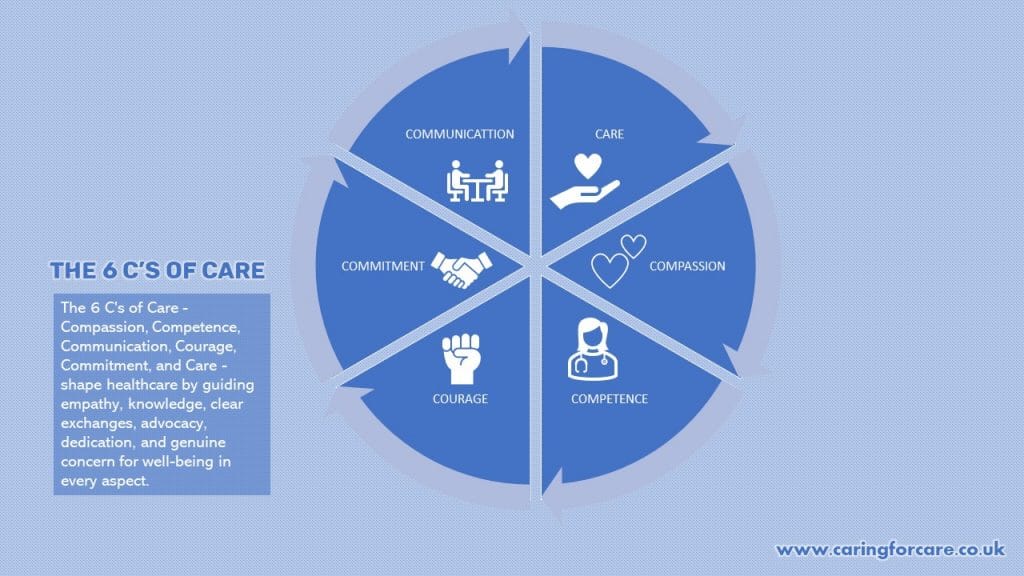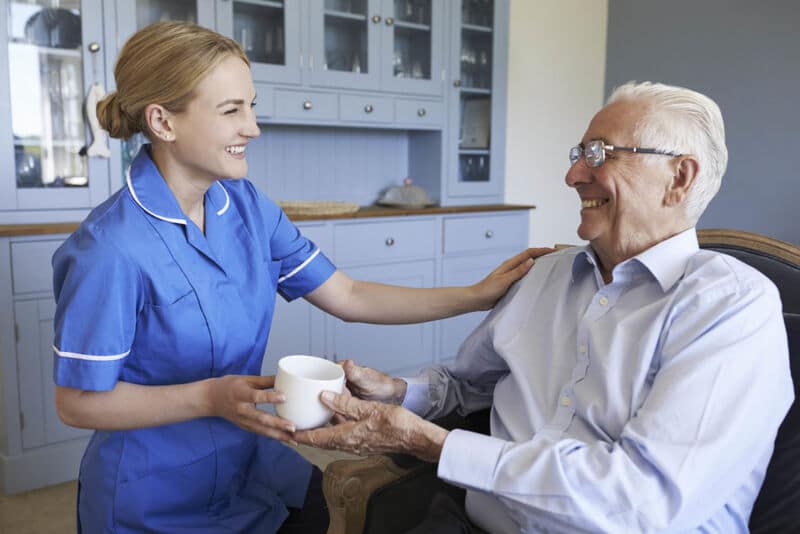The 6 Cs of Nursing: Why do they matter?

The 6 Cs of Nursing: What is new?
In healthcare, nursing is a very important part of taking care of patients. The 6 Cs of Nursing are like important rules that help care workers, nurses and other healthcare professional provide the best care.
They’re like the building blocks of good healthcare. The 6Cs of Nursing make healthcare and nursing tasks more than just regular tasks.
In this blog post, we’ll discuss the 6 Cs: Care, Compassion, Competence, Communication, Courage, and Commitment.
We’ll explore where they came from and why they matter, particularly in keeping patients at the heart of care.
Table of contents
- The Evolution of the 6Cs: Shaping a New Era of Healthcare
- What are the 6 Cs in healthcare and social care?
- Why Are the 6 Cs in Nursing Important?
- Explaining important Elements of the 6 C’s of Nursing
- Explore Mandatory Care Courses
- How Can You Put the 6Cs into Practice?
- The 6 Cs in Action: Practical Examples
- Online Care Course
- Compassion in Action: Ways to Building Warm and Welcoming Spaces
- Compassion in Practice Strategy
- Conclusion: Embracing the Legacy of the 6 Cs
The Evolution of the 6Cs: Shaping a New Era of Healthcare
In 2012, Jane Cummings, who was the Chief Nursing Officer in England at the time, made a big change in healthcare.
She introduced something called the 6 Cs. She did this because she was worried that the quality of care in the NHS (National Health Service) was getting worse.
Her idea, the 6 Cs, quickly became popular all around the world as a way to talk about caring for patients. These ideas – Care, Compassion, Competence, Communication, Courage, and Commitment – made sense to healthcare workers everywhere.
They helped make healthcare better in many different places.

Flicker: Professor Jane Cummings
The whole world of healthcare got a big thumbs-up when the World Health Organization (WHO) gave its official support to the 6 Cs in 2015.
This meant that the 6Cs became an important way to make healthcare better and put patients at the center of care.
Now, as the 6 Cs celebrate their 20th year, their influence continues to make a big difference.
They haven’t only changed how we care for people but also made healthcare professionals feel like what they do really matters.
The story of the 6 Cs shows how one person’s good idea, like Cummings, can have a lasting impact on healthcare.
The 6 Cs are more than just ideas; they’re like sparks that make healthcare more caring and skilled
What are the 6 Cs in healthcare and social care?
The 6 C’s of Care – Compassion, Competence, Communication, Courage, Commitment, and Care – shape healthcare by guiding empathy, knowledge, clear exchanges, advocacy, dedication, and genuine concern for well-being in every aspect.

Image: The 6 C’s of Care
Sometimes you might hear people use the terms “6 Cs of Nursing” and “6 Cs of Care.” They are pretty much the same as the “6 Cs of Health and Social Care.”
These words all point to the same set of important ideas. These ideas highlight the key values that are really important for giving good care and services in nursing, healthcare, and social care.
The “6 Cs of Health and Social Care” have longer names, but people might also call them the “6 Core Values of Care” or just “The 6 Values in Healthcare.”
These different names all show how much these ideas matter in making sure care and service in healthcare and social care are of the highest quality.
Why Are the 6 Cs in Nursing Important?
The 6 Cs are the foundation of compassionate care. When healthcare and nursing professionals put these values into practice, they can make a real difference in the lives of patients.
The significance of the 6Cs stems from their embodiment of vital attributes sought by patients in their healthcare providers.
Patients’ experience of feeling cared for, respected, and understood serves as a cornerstone for fostering positive healthcare encounters.
The 6 Cs are important for a few key reasons:
- They focus on what patients need: The 6 Cs make sure that healthcare providers pay attention to what patients want, like being cared for, respected, and understood. This is really important to make patients feel good about their healthcare experiences.
- They encourage kind and caring healthcare: The 6 Cs are like the building blocks of compassionate care in healthcare and nursing. They guide healthcare professionals to do more than just their basic job and really make a positive impact on patients’ lives.
- They help keep healthcare safe: These values are a big deal for making sure that healthcare is safe. Healthcare providers who follow the 6 Cs, like being skilled, good at communicating, and brave, help lower the chances of making mistakes that could harm patients.
- They ensure high-quality care: When healthcare professionals follow the 6 Cs, it means they’re giving top-notch care and services in nursing, healthcare, and social care.
In a nutshell, the 6 Cs matter because they make sure patients get the care they want, create a kind and safe healthcare environment, and guarantee top-quality healthcare and social care.

Nursing Interview Tips: Find out how to use the six c’s for your next interview.
START CARE MANDATORY COURSES – VIEW FULL COURSE LIST AND PRICES
Explaining important Elements of the 6 C’s of Nursing
Next, we need to discuss the components of the 6 C’s.
We will explore and clarify the vital components of the 6 C’s of Nursing.
These six principles are fundamental in the world of healthcare, guiding nursing professionals to provide exceptional care and support.
By breaking down each element, we aim to provide a clear understanding of how they contribute to compassionate and proficient nursing practice.
Care – Where Heart Meets Profession
At the core of every health and social care effort, there’s a fundamental value: Care. If we ponder these words, “care” is more than just a word; it’s a philosophy that connects us all.
Care’s essence is about embracing the well-being of those we help and understanding that their needs change, just like seasons do.
Imagine it like a mother’s gentle touch cradling a baby – caregivers must adjust their approach for each person.
Quality care isn’t a fixed thing; it changes.
Think of a nurse caring for an elderly patient’s emotional well-being as carefully as their physical health.
What is Care in Health and Social Care?
Care in health and social care means helping people with kindness and skill to make them feel better and improve their lives.
It includes things like looking after their health, talking to them, and making sure they’re safe and happy. It’s like being a friendly and capable helper for people who need support.
Care – Echoes Across Centuries
Throughout history, care has always been a guiding light for people.
In ancient times, like with the Egyptians, they had advanced medical knowledge and took care of the sick and wounded.
Temples were more than just places of worship; they were some of the earliest hospitals where priests also acted as healers.
In the medieval period, monasteries looked after the sick, and monks provided remedies and comfort.
Example in history: The Lady with the Lamp
Florence Nightingale, a pioneer in nursing during the 19th century, embodied the spirit of care. Known as the “Lady with the Lamp,” she tended to wounded soldiers during the Crimean War. Her tireless dedication laid the groundwork for modern nursing, emphasizing compassion and hygiene.
Compassion – Intelligent Kindness in Action
Compassion, often called “smart kindness,” is like a silver thread that connects caregivers and those they care for. Imagine a doctor who kneels down to a child’s eye level, offering a comforting smile before a procedure.
Compassion is more than just a feeling; it’s like a bridge that links people’s hearts and eases worries.
Whether it’s a therapist creating a safe space for someone who has experienced trauma or a caregiver comforting someone in pain, compassion turns caring into an art of healing.
What is compassion in health and social care?
Compassion in health and social care means showing understanding, empathy, and kindness towards individuals in need of care and support.
It involves genuinely caring about their well-being, acknowledging their feelings and concerns, and taking actions to alleviate suffering or distress.
Compassion – An Ancient Wisdom Revived
Compassion, a timeless virtue, regained importance in healthcare in the 20th century.
This was when psychological theories highlighted that patients needed both emotional and physical support.
Hospice care, which is all about compassion, changed the way people experience the end of life.
Example in history: The Hospice Movement
Cicely Saunders, a British nurse, made a big change in end-of-life care through the hospice movement.
She thought about care in a whole way, looking at how it affects people emotionally, spiritually, and physically.
Her work at St. Christopher’s Hospice showed a new way to provide caring end-of-life support.
Competence – Mastering the Craft of Caring
Being competent is like having a helpful guide in the world of health and social care. It’s a bit like a map that helps us with knowledge, skills, and being able to adapt.
Just as a skilled pilot lands a plane safely, healthcare professionals need to know what they’re doing and make good choices.
For instance, a mental health counselor needs to use what they know about the mind along with kindness to help their patients deal with life’s challenges.
What is Competence in health and social care?
Competence in health and social care means having the knowledge and skills to provide effective and safe care, meeting the needs of those receiving support, and making informed decisions to enhance their well-being.
Competence – From Art to Science
The shift in healthcare from being more of an art to becoming more scientific gave rise to the concept of competence.
In ancient times, healers mainly depended on tradition and their instincts.
However, during the Renaissance, they began to study medicine in a more organised manner, leading to many medical advancements.
Today, competence involves combining what you know, what you can do, and using evidence-based methods.
Example in history: Ignaz Semmelweis and Handwashing
In the mid-19th century, Hungarian physician Ignaz Semmelweis demonstrated the significance of hand hygiene in preventing infections. His data-driven approach showcased the power of competence in transforming patient outcomes.
Communication – The Dance of Connection
Think of health and social care like a dance, where communication is the music – a blend of words, actions, and moments of silence that work together to ensure understanding.
It’s not just about speaking; it’s also about listening, understanding, and responding with kindness.
For instance, when a speech therapist plays games and uses art to connect with a child with a speech problem, they create a comfortable space for communication.
Good communication can overcome barriers, like language, physical challenges, or feelings, and it’s the key to providing effective care.
What is Communication in health and social care?
Communication in health and social care involves the exchange of information, ideas, and feelings between care providers and individuals in need.
It’s about using words, gestures, and active listening to understand and respond with empathy, creating effective and compassionate connections that meet the physical, emotional, and social needs of those receiving care.
Communication – A Modern Language of Healing
Communication, the lifeblood of healthcare, became more important in the 20th century.
Patient-centered care went beyond one-sided conversations and started focusing on dialogue, understanding, empathy, and making decisions together.
It’s not just about the words; it’s also about understanding, showing respect, and giving people the power to make choices about their care.
Example in history: Patient-Centered Care
Dr. Kate Granger, a doctor who had terminal cancer, was a strong advocate for patient-centered care. Her “Hello, my name is…” campaign highlighted the significance of introducing yourself to patients, a simple act that builds a bond and makes communication better.
Courage – Embracing the Bold Path
Courage isn’t just about big heroic deeds; it’s often the small choices we make every day that show it.
In healthcare, courage is the compass that helps us in uncertain situations.
Think about a nurse speaking up for a patient’s rights when faced with obstacles, or a medical researcher questioning the usual ways to find new treatments.
These examples are all about courage – the power that drives us to fight for what’s right, face challenges, and push the limits of care.
What is Courage in health and social care?
Courage in health and social care means having the bravery to do what’s right, even when it’s difficult or challenging.
It’s about standing up for the well-being and rights of the people you’re caring for, navigating obstacles, and pushing the boundaries to provide the best possible care.
Courage – Forging New Paths
Across history, healthcare pioneers have shown courage when things got tough.
Nowadays, courage shows up in different ways, like fighting for patients’ rights, questioning what’s considered normal, and being open to new ideas.
It’s all about being brave enough to do what’s right, even when it’s not easy.
Example in history: Elizabeth Blackwell, a Trailblazer
In 1849, Elizabeth Blackwell became the first woman to receive a medical degree in the United States. Her courage shattered gender norms, paving the way for countless women to enter the medical profession.
People Also Read: Thinking of a career in elderly care? Here’s what you should know
Commitment – Fueling the Flame of Excellence
Think of commitment as a trusted compass that points the way to delivering excellent health and social care. It’s like a strong promise, not just to the job, but also to the people we care for.
When a physical therapist works hard to help their patient recover and adjusts exercises as needed, that’s commitment in action.
And it’s not just about the job; it’s also about always trying to learn and get better, which makes care even better.
What is Commitment in health and social care?
Commitment in health and social care means making a strong promise to provide the best care and support to individuals in need.
It’s about sticking to that promise and always working to get better at what we do. This helps us take care of the people we serve and keep improving our skills as professionals.
Commitment – Sustaining the Flame of Dedication
Think of commitment as a strong promise to give the best care.
This promise has been passed down from ancient healers to today’s healthcare workers.
Nowadays, commitment means not only taking care of people but also always trying to get better at our jobs.
Example in history: Dr. Paul Farmer and Partners in Health
Dr. Paul Farmer’s commitment to global health equity led to the founding of Partners in Health. This organisation brings medical care to underserved regions, demonstrating how dedication can transform lives on a global scale.
“Compassion is the basis of morality.”
Explore Mandatory Care Courses
How Can You Put the 6Cs into Practice?
The 6Cs aren’t just fancy ideas; they’re practical skills you can learn and improve. Check out some advice on how to use the 6Cs in your healthcare work:
Care: Take time to know your patients individually. Understand what they need. Listen to their concerns, so they feel supported and relaxed.
Compassion: Show empathy, kindness, and understanding to your patients. Try to understand how they feel and what they’re going through.
Competence: Keep up with the latest medical knowledge and use proven methods. Be confident in what you know and be ready to answer patient questions.
Communication: Make sure you can talk effectively with patients, their families, and other healthcare workers. Keep things clear and simple so everyone can understand.
Courage: Have the bravery to stand up for your patients, speak up for what they need, and make tough decisions. Don’t hesitate to challenge the usual way of doing things if it’s better for your patients.
Commitment: Promise to give excellent care and always look for ways to improve. Keep learning and growing as a healthcare professional.
These are the 6 Cs of healthcare.
START CARE MANDATORY COURSES – VIEW FULL COURSE LIST AND PRICES
The 6 Cs in Action: Practical Examples
The 6 Cs are not just ideals; they are actionable principles that shape exceptional healthcare practice. Consider these instances that illuminate the 6Cs of care in action:
- Care: Caring Nurse
A nurse dedicates herself to looking after a patient with a serious illness, providing kindness, dignity, and respect.
Throughout the patient’s difficult journey, the nurse ensures they feel dignified and well-cared for. It is important to demonstrate one of these 6 Cs of nursing.
- Compassion: Compassionate Doctor
A doctor communicates with compassion, explaining the patient’s illness and treatment options in a way that shows genuine care.
The patient thinks about their choices and feels supported, knowing they’re not facing their health challenges alone.
- Competence: Skilled Healthcare Team
A healthcare team shows their competence by working together to save a very sick patient’s life, even in tough situations. They’re experts and work together well.
Competence is an important part of the 6 Cs in nursing.
- Communication: Effective Communicator-Nursing Student
A nursing student is great at explaining complex medical stuff to patients and their families. They talk in a way that’s reassuring and easy to understand, so everyone is on the same page.
Communication is a very important part of the 6 Cs in nursing.
- Courage: Courageous Social Care Worker
A social care worker bravely stands up for an elderly resident’s unique needs, even if it means challenging the usual routines.
They’re dedicated to their role and making sure the resident is happy and well.
- Commitment: Committed Social Worker
A social worker is focused on always improving their work. They work hard to provide the best care to the people they assist in social care, showing unwavering dedication.
Do you need any online training?
Online Care Course
Compassion in Action: Ways to Building Warm and Welcoming Spaces
Compassion in action, also known as compassion in practice, is a healthcare plan that’s all about providing caring and patient-centered care.
It stresses the importance of treating patients, their families, and healthcare staff with kindness, understanding, and respect.
This approach understands that healthcare isn’t just about medical treatments; it also involves offering emotional support and building connections with people.
It’s built upon the “6 C’s” of care: care, compassion, communication, courage, competence, and commitment.
What does Compassion in Action mean?
Compassion in Action means going the extra mile to be extra caring and friendly in healthcare and social care.
It’s like mixing in a significant amount of empathy and companionship with medical and social care.
This makes patients, care receivers, their families, and healthcare and social care workers feel happy and respected.

How to apply the compassion in action
Here’s how you can apply the compassion in action principles with some examples to show:
- Putting Patients First: When you as a doctor, nurse or care worker use compassion in practice, you should ensure you actively listen to what patients want and need. Think about a patient who’s scared of needles. Your goal in this case would be to find ways to make the patient feel more at ease.
- Talking with Care: Compassion means speaking to patients and their families in a way that makes them feel cared for. For instance, if a child is worried about surgery, a compassionate doctor might explain things gently and answer all their questions.
- Feeling What They Feel: Compassion encourages you as a healthcare workers to try to understand how patients are feeling, like a friend would. This can help patients feel safer and happier. For example, if a patient is sad about being in the hospital, you might offer comforting words.
- Fairness for Everyone: Compassion also means ensuring that everyone receives the same good care, regardless of where they come from or how much money they have. It’s about fairness. Imagine two patients, one wealthy and one not so wealthy. Compassionate care in this sense would mean you should give both the same attention and treatment.
- Taking Care of the Caregivers: Doctors and nurses work hard. Compassion in action reminds everyone to take care of themselves too. This way, they can keep helping patients with a smile.
Facts:
Almost half of healthcare workers sometimes feel very tired and stressed. Compassionate care can help them stay healthy too.

Other real examples:
- Always Learning: In your healthcare journey, there’s always something new to discover. Compassionate care means that as a doctor, a nurse, or a care worker, you need to keep learning new things to provide even better help for you, just like you keep learning new things in school to be great at your job.
- Family Matters: Compassion also includes the family of those you care for. They become part of the decisions and conversations about your care. Think about a parent who understands what the doctor is doing for their sick child – that’s compassion.
- Comfortable Spaces: Compassion goes beyond simply talking to patients and their families; it’s about creating a hospital environment that feels warm and welcoming for everyone. Imagine being in a hospital room that feels like home – that’s what a compassionate healthcare place aims to create for you.
Did you know?
- About 90% of patients say that feeling respected and cared for is super important during their medical care.
- When healthcare workers use compassion, patients are happier and might heal faster.
Compassion in practice (action) makes hospitals and clinics feel like friendly places.
It’s about understanding, fairness, and caring for everyone involved. This helps patients feel better, not just in their bodies, but in their hearts too.
Compassion in Practice Strategy
The 6 Cs are a concept introduced by the Compassion in Practice approach.
They are a set of guiding principles that apply to various care and support situations in the UK.
These guidelines highlight the importance of compassion in the medical field and how it can be used in different settings like:
- care facilities,
- clinics,
- community agencies,
- dentist offices,
- GP offices,
- ambulances,
- hospices, and more.

Also Read: Dignity in Care and Why it matters
Applying the 6 Cs of Nursing to Diverse Care Settings:
These principles resonate in a wide range of care settings, spanning various places where care and support are given:
- Care Homes: This includes residential homes, nursing homes, and dementia care facilities.
- Clinics: These comprise medical and specialty clinics that offer specialized care.
- Community Services: This addresses care provided within local communities.
- Dental Surgeries: Remarkably, the 6 Cs align with dental care, and some individuals even receive free treatment.
- GP Surgeries: Reflecting the commitment of general practitioners to compassionate care.
- Home Care and Services: Recognising the significance of care provided within homes.
- Ambulances: Highlighting compassion in emergency medical services.
- Hospices: Embracing compassionate end-of-life care.
- Phone and Online Advice: Extending compassion to virtual care and advice.
- Prison Healthcare: Acknowledging the importance of care for incarcerated individuals.
Applying the 6 Cs for Workers and Volunteers:
These principles aren’t confined to care settings alone. The 6 C’s extend to workers and volunteers who play crucial roles in these environments:
- Carers: Demonstrating compassion in dedicated caregiving.
- Disability Support Workers: Upholding the 6 C’s when supporting individuals with disabilities.
- Home Care Workers: Bringing compassion to home-based care services.
- Attendant Care Workers: Ensuring compassion in assisting those in need.
- Personal Care Workers and Assistants: Embodying the 6 C’s in providing personal assistance.
- Volunteer Carers: Reflecting compassion in volunteer caregiving.
- Occupational Therapists: Integrating compassion into therapeutic interventions.
- Community Support Workers: Extending care compassionately within communities.
- Doctors and GPs: Practicing with compassion in medical care.
- Nurses: Incorporating compassion into nursing practices.
- Dentists and Hygienists: Exemplifying compassion in dental care.
- Paramedics: Demonstrating compassion in urgent medical response.
YOU CAN MAKE ENQUIRIES ON COURSES : enquiries@caringforcare.co.uk 01782 563333
Conclusion: Embracing the Legacy of the 6 Cs
As we look back in time, the legacy of the 6 Cs of nursing guides our way.
These values have always been there, from ancient times to today, in places like hospitals and temples. They’ve shaped how we take care of people, affecting how we interact, the results we achieve, and the stories we leave behind.
If you’re a healthcare professional today, you’re carrying on this tradition. Every time you make a diagnosis, have a conversation, or show courage, you’re part of the ongoing story of care.
So, let’s keep moving forward, keeping the spirit of the 6 Cs alive, and continue the amazing journey of providing excellent health and social care.
Let us Help you
We’ll help you find the right course for your needs. Tell us a little bit about your situation and what you would like to achieve.
We’ll get back to you within one working day.
